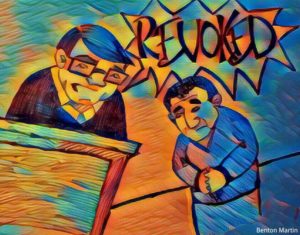Supervised Release Cannot Be Revoked After Supervision Term Ends
Anthony Holman's supervised release was revoked for failing to pay restitution and picking up a new charge. However, the violation petition was not submitted until after Holman’s term of supervision had already expired. No summons was pending at the time either. Generally, whenever a U.S. Probation Officer believes that a defendant has violated his or her supervised release, a violation petition will be submitted to the Court. The petition can request that no action be taken, that a summons for the defendant's appearance be issued, or that an arrest warrant be filed. The U.S. Court of Appeals DC Circuit reversed and vacated the revocation for lack of jurisdiction. The expiration of a term of supervised release can be tolled under 18 U.S.C. § 3583(i).
That statute provides:
(i) Delayed Revocation.—
The power of the court to revoke a term of supervised release for violation of a condition of supervised release, and to order the defendant to serve a term of imprisonment and, subject to the limitations in subsection (h), a further term of supervised release, extends beyond the expiration of the term of supervised release for any period reasonably necessary for the adjudication of matters arising before its expiration if, before its expiration, a warrant or summons has been issued on the basis of an allegation of such a violation. 18 U.S.C. § 3583(i).

Supervised Release
However, because no summons was issued for the alleged violations prior to the expiration of Holman’s supervision, the district court could not rely on § 3583(i) to support jurisdiction over the revocation, the court held.
The appeals court also rejected the Government’s argument that Holman’s failure to pay restitution amounted to an “ongoing” violation. The court held that Holman paid what he could when he was working and that no evidence existed which showed a “willful” failure to pay.
United States v. Holman, 16-3107 ( U.S. Court of Appeals - DC Circuit 2017).
Featured image by: Benton Martin (Own work) [CC BY-SA 4.0 (http://creativecommons.org/licenses/by-sa/4.0) , via Wikimedia Commons courts.
Recommended for you
Ex Parte Communications By Judge With Jury Required Reversal Of Convictions
At Martin Bradley III’s trial for racketeering, mail fraud, wire fraud, and money laundering, the district court had two ex parte communications with the jury. Bradley’s defense lawyers did not become aware of notes until after his appeal. Bradley filed a 2255 motion arguing, in addition to other things, that the court had violated Rule…
Drug Treatment And Vocational Training Improper Sentencing Considerations
Christopher Thornton moved for a downward variance at sentencing arguing, among other things, that “in-prison treatment during the proposed thirty-eight months would help mitigate any potential risk he posed to the community.” The district court denied the motion, but in doing so said that Thornton had “mental-health issues, and he needs drug treatment” and that…
Amendment 782 Motion Reconsideration
Reinaldo Rivera moved for 18 U.S.C. § 3582(c)(2) relief based on Amendment 782 to the Guidelines, commonly known as “drugs minus 2.” The district court granted the motion and reduced his sentence to 420 months from LIFE. But in doing so, the district court believed Rivera’s mandatory minimum was 30 years for his CCE conviction.…




